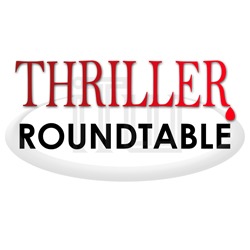

November 22-28: “Which comes first, the reader, or the story?”
Do the needs of the reader conflict with the needs of the story? What if the reader wants to be entertained, but the author wants their fiction to include a message?
The discussion is over, but you can still read what International Thriller Writers members Julie Korzenko, Sharon Linnea, Heather Graham, Grant McKenzie, Boyd Morrison, Austin Camacho, AJ Hartley, Brad Parks, and others had to say in this thoughtful Roundtable discussion.
Born in England, raised in New England and subsequently settling in the South, Julie Korzenko’s background has strongly influenced her eclectic taste in literature, art and life experiences. A passionate advocate for nature and wildlife, she began college as a zoology major but ultimately graduated with a business degree in paralegal studies. Her career has run the gambit from law to network administration to marketing and back to law. Her first novel, DEVIL’S GOLD, was published by Medallion Press in 2009.
Sharon Linnea is an award-winning biographer, novelist, and one of the top inspiration journalists in the country. Sharon’s extensive background as a book and magazine editor has led her into many interesting venues, where she has gotten to interview and work with cultural historians, psychologists, film and recording artists, and Holocaust survivors. She spent five years studying Hawaiian history for her biography Princess Ka’iulani: Hope of a Nation, Heart of a People, (winner of the Carter G. Woodson Award) and another five years interviewing modern Hawaiian islanders from all walks of life for Chicken Soup from the Soul of Hawai’i. She is currently promoting the Eden Thrillers and working on a new series of nonfiction books. Her most recent book is LOST CIVILIZATIONS, which was published by Sterling in May 2009.
Heather Graham is the New York Times and USA Today bestselling author of over a hundred novels including suspense, paranormal, historical, and mainstream Christmas fare. She lives in Miami, Florida, her home, and an easy shot down to the Keys where she can indulge in her passion for diving. Travel, research, and ballroom dancing also help keep her sane; she is the mother of five, and also resides with two dogs, a cat, and an albino skunk. She is CEO of Slush Pile Productions, a recording company and production house for various charity events. Look her up at theoriginalheathergraham.com, writersforneworleans.com oreheathergraham.com.
Born in Scotland, living in Canada and writing American fiction, Grant McKenzie likes to wear a toque and kilt with his six-guns. His debut novel, SWITCH, earned fantastic reviews internationally when it was published in mass-market paperback by Bantam TransWorld UK on July 2, 2009, in translation in Germany by Heyne in August, and in trade paperback in Canada by Penguin in August 2010. In 2011, it will be translated into Complex Chinese for Spring International Publishers of Taiwan and into Russian for AST – the largest publisher in Russia. Grant’s second novel, NO CRY FOR HELP, was published in the UK, Australia and New Zealand in mass-market paperback by Bantam TransWorld in November 2010. Grant’s short stories have been featured in the First Thrills anthology edited by Lee Child from Tor/Forge, plus Out of the Gutter and Spinetingler magazines, and his first screenplay won a fellowship at the Praxis Centre for Screenwriting in Vancouver, B.C.
Boyd Morrison received his bachelor’s in mechanical engineering from Rice University in Houston. He has a PhD in industrial engineering from Virginia Tech and was formerly employed at NASA, Microsoft’s Xbox Games Group, and Thomson-RCA. In 2003, he fulfilled a lifelong dream and became a Jeopardy! Champion. He is also a professional actor who has appeared in commercials, stage plays, and films. He lives with his wife in Seattle. Visit his website at www.boydmorrison.com.
Austin S. Camacho has written a series about private detective Hannibal Jones and a series of adventure novels featuring mercenary Morgan Stark and jewel thief Felicity O’Brien. To pay the mortgage he answers media queries for the Defense Department. Camacho lives in Springfield, Virginia with his lovely wife Denise and Princess the Wonder Cat.
British born writer A.J. Hartley got his first taste for archaeology touring sites in Greece and Rome as a child with his family. As an English major at Manchester University he took extra classes in Eqyptology and got a job working on a Bronze Age site just outside Jerusalem. Since then, life has taken him to many places around the world, and though he always leaned more towards the literary than to the strictly historical, his fascination with the past has continued unabated. He has an M.A. and Ph.D. in English literature from Boston University and is currently the Distinguished Professor of Shakespeare in the Department of Theatre and Dance at the University of North Carolina at Charlotte. As well as being a novelist and academic, he is a screenwriter, theatre director and dramaturg (and has a book explaining what that is). He has more hobbies than is good for anyone, and treats ordinary things like sport and food and beer with a reverence which borders on mania. He is married with a son, and lives in Charlotte.
Brad Parks’ first novel, Faces of the Gone, is the winner of the 2010 Shamus Award for Best First Novel and has been shortlisted for the Nero Award. Library Journal called it “the most hilariously funny and deadly serious mystery debut since Janet Evanovich’s ONE FOR THE MONEY.” Yahoo.com called Brad “the literary love child of (Janet) Evanovich and (Harlan) Coben.” The Dartmouth College graduate spent a dozen years as a reporter for The Washington Post and The Newark Star-Ledger and is now a full-time novelist. EYES OF THE INNOCENT, the next Carter Ross novel, releases February 1, 2011, and the third and fourth books in the series are also written and awaiting publication. Parks lives with his wife and two small children in Virginia, where he hopes to keep writing novels until someone forces him to stop.
- LAST GIRL MISSING with K.L. Murphy - July 25, 2024
- CHILD OF DUST with Yigal Zur - July 25, 2024
- THE RAVENWOOD CONSPIRACY with Michael Siverling - July 19, 2024

